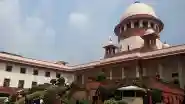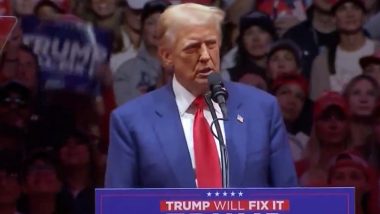Washington, November 6: A mostly smooth Election Day nationwide was marred in multiple battleground states Tuesday by a series of bomb threats and baseless claims of wrongdoing by former President Donald Trump. The bomb threats in parts of Arizona, Georgia and Pennsylvania turned out to be hoaxes, but forced evacuations and some polling places to extend hours.
The threats were reported throughout the day at polling locations in three metro Atlanta counties, all with large numbers of Democratic voters, and into the evening at polling places and election offices where ballots were being counted in Pennsylvania. Bomb threats also were reported at three voting locations in Navajo County, Arizona, according to the secretary of state's office. US Presidential Election Results 2024: Donald Trump and Kamala Harris Rack Up Early Wins As America Awaits Battleground Results.
Pennsylvania Gov Josh Shapiro said in an evening news conference that the hoaxes posed no danger to the public - or to the election. “Every legal, eligible vote will be counted and counted accurately, and the will of the people in the commonwealth of Pennsylvania will be respected," said Shapiro, a Democrat.
Neither Shapiro nor Pennsylvania State Police gave details about who might be behind the hoaxes or why Shapiro believed there was no threat to the public. In Georgia's Fulton County, which includes Atlanta, 32 of 177 polling places received bomb threats and five were briefly evacuated. The polling locations were able to reopen after the threats.
“That just shows you the resilience of our system and our people. We're battle-tested,” said Georgia Secretary of State Brad Raffensperger, a Republican. The FBI on Tuesday afternoon said many of hoax bomb threats in several states appeared to originate from Russian email domains. US Presidential Election Results 2024: Donald Trump Ahead With 120 Electoral Votes, Kamala Harris at 99.
The dramatic and troubling end to Election Day came after a highly successful early voting period, when at least half of all votes expected in the presidential election had been cast. By Tuesday, more than 84 million Americans had already voted. Overall, the final day of voting on Tuesday was characterized by the same kind of routine hiccups and frustrations seen in other elections: a polling worker forgetting to bring a key; ballot printing mistakes; ballot counting machines not working.
The vast majority of problems were “largely expected, routine and planned-for events,” said Cait Conley, senior adviser to the director of the Cybersecurity and Infrastructure Security Agency. Despite no evidence of widespread voting problems, Trump made unsubstantiated claims related to Philadelphia and Detroit, and raised questions about election operations in Milwaukee, the biggest cities in three states that will be crucial for deciding the presidency.
Local officials quickly knocked down the claims Trump made on his social media platform, saying there were no indications of any problems that would affect accurately tallying the vote. The absence of any significant problems had not stopped Trump, the Republican nominee, or the Republican National Committee, from making numerous claims of fraud or election interference during the early voting period, a possible prelude to challenges after Election Day.
In Georgia, a federal judge rejected as “frivolous” a last-minute effort by Republicans to challenge Atlanta-area election offices' collection of mail ballots last weekend - after early voting had ended. U.S. District Judge R. Stan Baker, a Trump appointee, said the GOP argument “does not withstand even the most basic level of statutory review and reading comprehension.”
Trump on Tuesday suggested he wouldn't challenge the results of the election - as long as it's fair. “If it's a fair election, I'd be the first one to acknowledge” the results, Trump said, though what meets that definition wasn't clear. The former president began making unsubstantiated claims about voting, ballot counting and law enforcement as Election Day voting neared its end.
He said on his social media platform that there was “talk about massive cheating in Philadelphia” and said law enforcement was on the way. He did not provide details, and there was no immediate indication of what he was referring to. His spokespeople did not respond to requests for comment about what he meant.
Philadelphia District Attorney Larry Krasner issued a statement rejecting Trump's claims as baseless. “There is no factual basis whatsoever within law enforcement to support this wild allegation,” Krasner said. “If Donald J. Trump has any facts to support his wild allegations, we want them now. Right now. We are not holding our breath.”
Federal election security officials and Shapiro also said they had seen nothing to support Trump's claims. Officer Miguel Torres of the Philadelphia Police Department said he was unaware of any special law enforcement mobilization or “any kind of incident” that would require it.
(The above story is verified and authored by Press Trust of India (PTI) staff. PTI, India’s premier news agency, employs more than 400 journalists and 500 stringers to cover almost every district and small town in India.. The views appearing in the above post do not reflect the opinions of LatestLY)












 Quickly
Quickly


